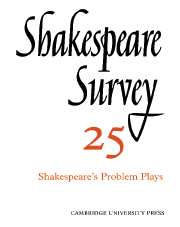Book contents
- Frontmatter
- The Problem Plays, 1920–1970: A Retrospect
- ‘Sons and Daughters of the Game’: An Essay on Shakespeare’s ‘Troilus and Cressida’
- The Options of the Audience: Theory and Practice in Peter Brook’s ‘Measure for Measure’
- Man’s Need and God’s Plan in ‘Measure for Measure’ and Mark iv
- The Design of ‘All’s Well That Ends Well’
- Directing Problem Plays: John Barton Talks to Gareth Lloyd Evans
- The Queen Mab Speech in ‘Romeo and Juliet’
- ‘Time’s Deformed Hand’: Sequence, Consequence, and Inconsequence in ‘The Comedy of Errors’
- Faith and Fashion in ‘Much Ado About Nothing’
- ‘The Merry Wives of Windsor’ as a Hallowe’en Play
- ‘The Tempest’ at the Turn of the Century: Cross-Currents in Production
- Variations Within A Source: From Isaiah XXIX To ‘The Tempest’
- The Life of George Wilkins
- A Neurotic Portia
- Of an Age and for All Time: Shakespeare at Stratford
- The Year's Contributions to Shakespearian Study 1 Critical Studies
- 2 Shakespeare’s Life, Times, and Stage
- 3 Textual Studies
- Index
- Plate section
The Problem Plays, 1920–1970: A Retrospect
Published online by Cambridge University Press: 28 March 2007
- Frontmatter
- The Problem Plays, 1920–1970: A Retrospect
- ‘Sons and Daughters of the Game’: An Essay on Shakespeare’s ‘Troilus and Cressida’
- The Options of the Audience: Theory and Practice in Peter Brook’s ‘Measure for Measure’
- Man’s Need and God’s Plan in ‘Measure for Measure’ and Mark iv
- The Design of ‘All’s Well That Ends Well’
- Directing Problem Plays: John Barton Talks to Gareth Lloyd Evans
- The Queen Mab Speech in ‘Romeo and Juliet’
- ‘Time’s Deformed Hand’: Sequence, Consequence, and Inconsequence in ‘The Comedy of Errors’
- Faith and Fashion in ‘Much Ado About Nothing’
- ‘The Merry Wives of Windsor’ as a Hallowe’en Play
- ‘The Tempest’ at the Turn of the Century: Cross-Currents in Production
- Variations Within A Source: From Isaiah XXIX To ‘The Tempest’
- The Life of George Wilkins
- A Neurotic Portia
- Of an Age and for All Time: Shakespeare at Stratford
- The Year's Contributions to Shakespearian Study 1 Critical Studies
- 2 Shakespeare’s Life, Times, and Stage
- 3 Textual Studies
- Index
- Plate section
Summary
A survey of attitudes since 1920 towards Shakespeare’s Problem Plays or Dark Comedies, Troilus and Cressida, All’s Well That Ends Well and Measure for Measure, invites two observations neither of which would be true of any other Shakespearian group. First, the plays – particularly Measure for Measure and Troilus – have undergone a revaluation so radical as to amount to a rediscovery, and this re-assessment itself reflects changes in literary and theatrical taste. Second, the aesthetic validity and critical usefulness of regarding these plays as a group has been increasingly questioned. A third point is that, while the study of texts and sources has advanced, research has unearthed no new fact about the original date of writing or the circumstances of first performance of any of the plays.
Today, when Measure for Measure and Troilus and Cressida are set books at 'A'-level, and when all three plays come up regularly, not just for a token staging, but for their full quota of performances in repertory at Stratford and elsewhere, it seems incredible that around 1870 William Poel (the first modern director ever to stage all three plays) was recommended by his tutor never to read Measure for Measure and Troilus and Cressida, as being improper; or that in 1906 townspeople in Oxford opposed an undergraduate performance of Measure for Measure; or that in 1913 F. R. Benson had such qualms about himself staging Troilus at Stratford that he preferred to invite Poel to revive his production for two performances on a single day.
- Type
- Chapter
- Information
- Shakespeare Survey , pp. 1 - 10Publisher: Cambridge University PressPrint publication year: 1972

